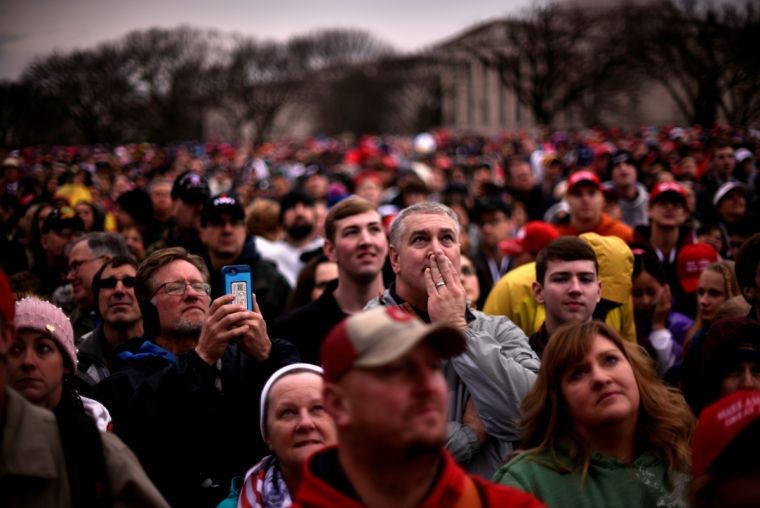No, he isn't the Messiah: Why you need to stop worshipping your political idol

GK Chesterton is said to have remarked: 'When men choose not to believe in God, they do not thereafter believe in nothing, they then become capable of believing in anything.'
To all intents and purposes, the vast majority of British people have stopped believing in the Christian God, and probably all gods. America clings on to belief rather more, but still seems to be on the same trajectory.
In this environment, Chesterton's words seem less pithy aphorism and more accurate prediction.
Humans seem to need to replicate many of the facets of religion, even in a society which has broadly got rid of traditional theism. Witness the feverish devotion to the cult of Apple which prompts pilgrimages to shrines of consumption and hysteria in more evangelical adherents.
Just last week one church leader tweeted to point out the similarity between the crowd's response at Glastonbury music festival and the worshipping environment of a charismatic church. Hands are raised to acclaim a greater force.
Why would anyone think raising hands in church is strange? Just watch #Glastonbury2017 Humans were made to worship. We have to. Who do you?
— Matthew Hosier (@matthewhosier) June 23, 2017
Another area in which we seem to be unable to get away from faith is in our messianic devotion to public figures. For some it's pop stars and actors. Others reserve their adulation for their favourite sporting icon.
Recently, the phenomenon of the celebrity politician has taken centre stage. We are now in the grip of messianic fervour for politicians of different stripes.
Witness the Donald Trump phenomenon. Speaking to the Republican Convention last year, Trump boasted, absurdly: 'Nobody knows the system better than me, which is why I alone can fix it.... I am your voice.'
White evangelical voters have rallied to his cause. Despite his calamitous moral flaws, Trump received 81 per cent of the evangelical vote – more than even George W Bush. Just this week, Trump's latest vile outburst on Twitter drew little criticism from his fans.
It isn't just Trump, of course. Bernie Sanders, a politician far less convinced of his own divinity than Trump, still attracted hordes of millenarian fans.
In the UK, we have seen a similar phenomenon with Jeremy Corbyn. The devotion that the Labour Leader attracts was demonstrated at the giant Glastonbury music festival last weekend. 'Oh, Jeremy Corbyn' chanted the crowd, repeatedly. He then appeared before the masses to speak and to receive their adulation.
Corbyn's appeal is partly about his policies. Getting rid of tuition fees and taking the railways into public ownership are popular and pragmatic. But how does Corbyn get away with his support for Brexit, among young voters who are mostly Remain supporters? Through the sheer weight of support he personally has garnered. We're repeatedly told by his supporters that Corbyn has always 'been on the right side of history', for example.
Supporting a political leader even when his views are out of kilter with your own may just be a special type of 21st century cognitive dissonance. Or are we witnessing a contemporary replaying of the Euthyphro dilemma? In its most basic form, this question asks whether something is good because God says it is, or whether God says it's good because it already is.
Replace 'God' in this question with your chosen political leader. Is Trumpcare good because the President says it is, even though it will adversely affect many of his supporters? Is Brexit OK, because Jeremy Corbyn is a life-long EU-sceptic?
We may pity the hapless inhabitants of North Korea, forced to worship long-dead dictators, but we have a watered-down version of it in the West. On the right, Ronald Reagan and Margaret Thatcher have gone long past canonisation – they are demi-gods, whose presence broods over their parties to this day. Invoking the blessed Margaret or Ronald is a trick so hackneyed, it's amazing a new generation of politicians still try it, but try it they do.
The left isn't immune. Bill Clinton and Tony Blair are revered for their rhetorical abilities and election-winning prowess. Both leaders seemed possessed of something of the messianic zeal themselves, so maybe it's little surprise their devoted followers maintain the mirage, long after both fell from grace.
In the book of Daniel, one of the most startling images is of the dream he interprets for the King of Babylon. In it, a vast metal figure has feet of clay. This is a reproach to all who see their political leaders as saviours. Even the most talented politician will let us down in some ways. Salvation is not the business that politicians are in.
When we fall into the trap of treating political leaders as demi-gods, we are at risk of doing more harm than good. When the reality eventually kicks in, the disappointment can be crushing. It also risks a dangerous Manichean approach to enemies. Anyone who does not share the devotion to the chosen political leader can very quickly be categorised as an enemy. At its more extreme end, this is a recipe for civil unrest.
None of this is to argue that politicians can't do great things – of course they can. Much of the devotion to the current crop of politicians comes from a good place – the desire for a better deal for the downtrodden, more fairness and justice and a politics in the common interest. But politicians always have feet of clay. In fact some of them are made almost entirely of it.
Follow Andy Walton on Twitter @waltonandy











